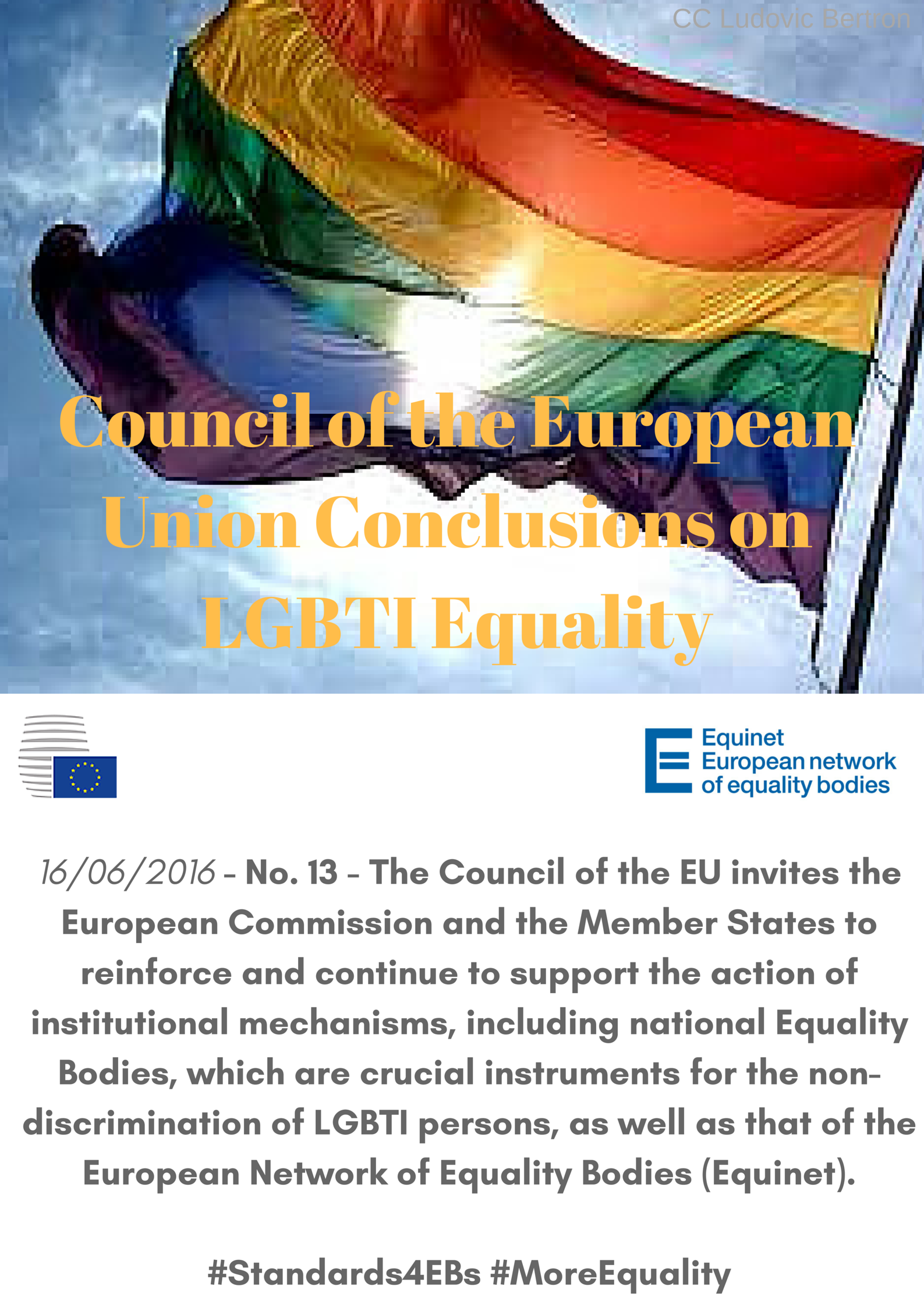As part of the Council conclusions adopted on 16 June 2016, a reinforcement and continued support of the action of institutional mechanisms was recommended, including national Equality Bodies, which are crucial instruments for the non-discrimination of LGBTI persons, as well as that of the European Network of Equality Bodies (Equinet).
European Council conclusions
European Council conclusions are adopted during each European Council meeting. They are used to identify specific issues of concern for the EU and outline particular actions to take or goals to reach. European Council conclusions can also set a deadline for reaching agreement on a particular item or for the presentation of legislative proposal. In this way, the European Council is able to influence and guide the EU’s policy agenda.
Ahead of the European Council meeting, the President of the European Council drafts guidelines for the conclusions. These are then discussed at the General Affairs Council and later adopted at the European Council meeting. Conclusions are adopted by consensus between all EU member states.
On 16 June 2016, the following conclusions on LGBTI equality were adopted.
Council conclusions on LGBTI equality
**”WHEREAS
1. Respect for human rights is a founding value for the Union, as stated in the Treaty on European Union and in the Charter of Fundamental Rights of the European Union.
2. It is important to promote common values, such as respect for human rights, as well as a common understanding that human rights are universal and apply to all.
3. The Treaty on the Functioning of the European Union (TFEU) provides that the Union shall aim in all its activities to eliminate inequalities and to combat discrimination on various grounds, including sex and sexual orientation, when defining and implementing its policies and activities and empowers the Council to take action to combat discrimination on those grounds.
4. This set of Conclusions builds on previous work and political commitments voiced by the European Parliament, the Council, the Commission and other relevant stakeholders, including the documents listed in Annex I.
5. Within its field of application, Article 21 of the Charter of Fundamental Rights of the European Union explicitly prohibits any discrimination based on sex and sexual orientation.
6. Discrimination on the grounds of sexual orientation is also prohibited under Union law in the field of employment.
**THE COUNCIL OF THE EUROPEAN UNION
7. TAKES NOTE of the Commission’s intention to ensure coherence between its List of actions to advance LGBTI equality and the Council’s Guidelines to promote and protect the enjoyment of all human rights by LGBTI persons in the context of the EU’s external policy.
8. INVITES THE EUROPEAN COMMISSION to promote the measures outlined in its List of actions to advance LGBTI Equality while fully respecting the Member States’ national identities and constitutional traditions as well as the competence of the Member States in the field of family law, to keep the Member States regularly informed of the progress made through the High Level Group on Non-Discrimination, Equality and Diversity and to pay attention to the enjoyment of fundamental rights by LGBTI persons when carrying out the fundamental rights check of any proposed policy measure.
9. INVITES THE EUROPEAN COMMISSION to report on progress with regard to its List of actions to advance LGBTI equality by the end of 2016 and yearly thereafter.
10. CALLS ON THE EUROPEAN COMMISSION to step up efforts in the field of comparative data collection on the discrimination of LGBTI persons in the EU, in the field of targeted awareness-raising activities in key areas, such as employment, education, health and sports, and in the field of knowledge of rights and the fight against under-reporting of discrimination incidents. Policies to combat discrimination of LGBTI persons fall within the broader context of equal treatment.
11. CALLS ON THE EUROPEAN UNION AGENCY FOR FUNDAMENTAL RIGHTS to further study the situation of LGBTI people by compiling high-quality statistics based on the most reliable methods.
12. STRESSES that, when promoting actions to advance LGBTI equality, the Commission should continue to cooperate with the Member States, as well as with the European Union Agency for Fundamental Rights (FRA) and other relevant EU agencies, civil society and, within the powers conferred on it in the Treaties, with relevant international organisations including the Council of Europe, the OECD and the UN.
13. INVITES THE EUROPEAN COMMISSION AND THE MEMBER STATES to reinforce and continue to support the action of institutional mechanisms, including national Equality Bodies, which are crucial instruments for the non-discrimination of LGBTI persons, as well as that of the European Network of Equality Bodies (Equinet).
**INVITES THE MEMBER STATES
14. To consider working together with the European Commission with regard to its List of actions to advance LGBTI equality, making full use of the High Level Group on Non-Discrimination, Equality and Diversity to discuss relevant issues and explore ways to accelerate progress, fully respecting the Member States’ competences, national identities and constitutional traditions; and
15. To take action to combat discrimination on the grounds of sexual orientation and gender identity.”

